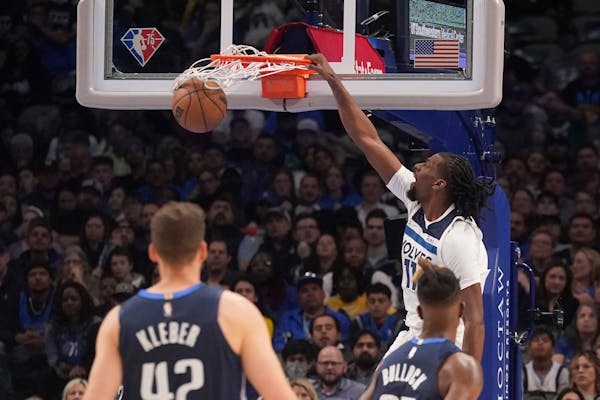Last week, after the Timberwolves defeated Denver, guard Anthony Edwards didn't hold back in criticizing himself for some of his shot selection and his approach to the game.
In responding to a question concerning how the Wolves could be more consistent this season, Edwards turned the question into a referendum about himself, saying he was responsible for a lot of team's issues in that area.
"Starting with myself, just can't come out being selfish, worrying about however many points I wanna score," Edwards said.
Edwards is often quick to pin responsibility on himself when things aren't going well for the Wolves. He'll often say after losses that he needs to play better — sometimes he'll say it so much that one might start to think his words ring hollow after a while. But Wednesday's self-analysis was more thought out and reflective than that. It's natural for young players in the NBA to think about their stats. Rarely do they admit it out loud.
"I think that's the main thing with me. I be worried so much about scoring and how many points I got and how many points I'm tryin' to get instead of just worrying about the little things — rebounding, boxing out, getting back on [defense]," Edwards said. "… I think if I come out with the mentality of not worrying about points, we'll be all right."
You also can't blame Edwards' thinking. If he makes an All-NBA team this season, he will make about $43 extra million on his next contract.
Edwards followed his Wednesday remarks with a 31-point performance in Saturday's 123-95 win over Utah on 13-for-19 shooting. He added eight rebounds and six assists, the kind of numbers in those latter two statistics the Wolves like to see whether Edwards, who is averaging 26.2 points per game, is scoring or not.
"I would say this, if he said it to [the media], then that shows a tremendous amount of self-awareness and it shows good growth and maturity and he just has to trust it," coach Chris Finch said of Edwards' Wednesday comments. "… Stay patient and just try to stay within the flow of the game."
What was notable about Edwards' night was that the scoring didn't all come at first — he had 12 points in the fourth quarter. But he was doing those other things on the floor that contributed to the Wolves' victory.
Edwards has been on himself to play smarter; however, there's a facet of his game that has increased this season that is not thought of in analytical circles as a smart thing to do — shooting more midrange shots.
A season ago, Edwards took 2.9 midrange shots per game, 36th in the NBA. This season, he is taking six per game, and hitting those at a 47% clip. This came after Edwards had a particularly good night Saturday shooting midrange shots; he was 6-for-7.
This has been a big focus of Edwards' offseason, analytics be darned.
"It's super important," Edwards said. "That's all I work on, man. I mean, I work on my trey ball too, but most of the time I'm working on my midrange. Like if I'm in the gym with my friends, or my brother, we're working on midrange. … 'Cause in the fourth quarter you can't always get to the paint, and they're going to run you off the three-point line. So you have to have an in-between game."
Finch cracked that with Edwards' midrange shots, "I love it when they go in."
"In the flow of the game, there's a time and place for them, and he's got the ability to make them," Finch said. "It's something that he wants to add to his game. But … you've got to double down on the things you're good at. He got to the rim a lot, and I thought he turned down some threes, and I'd like to see him let those fly a little more."
Edwards has shot 54% so far from three-point range. Hitting more threes would also have the added benefit of padding Edwards' point total, not that he's trying to count anymore.
"It's never really like a certain number, I'm just trying to score as many points as I can," Edwards said. "But when I'm not doing that, I think we in good shape."

Wild winger Mats Zuccarello will be out 3-4 weeks after surgery
NFC North picks: Will Bears' changes change their fortunes vs. Packers?

For the Wild, the Central is central indeed
![Glass and metal siding outside US Bank Stadium create graphic shapes against the summer sky. ] JIM GEHRZïjames.gehrz@startribune.com (JIM GEHRZ/S](https://arc.stimg.co/startribunemedia/PI2OUIUAMXQV5Y646EPZ7G2XLA.jpg?h=91&w=145&fit=crop&bg=999&crop=faces)

